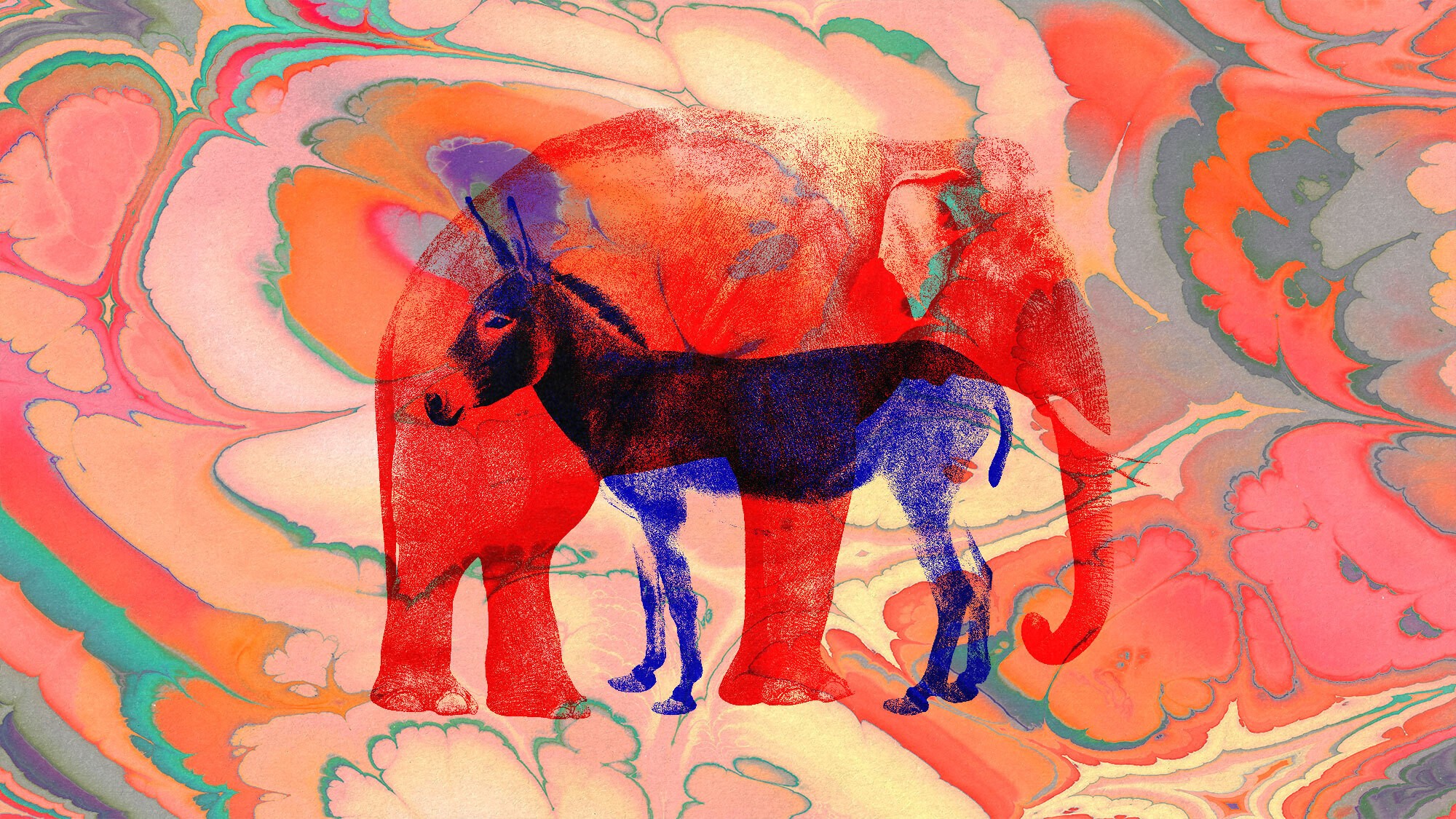If Donald Trump and Robert F. Kennedy Jr. really do team up to “make America healthy again” from the White House, the implications would be surprisingly trippy. On Sunday, at his rally in Madison Square Garden, Trump said he would let Kennedy “go wild” on health, food, and medicine if he wins the presidential election. The next day, Kennedy shared that Trump had promised him control of several agencies, including the CDC, the FDA, the Health and Human Services Department, the National Institutes of Health, the U.S. Department of Agriculture, “and a few others.”
Kennedy, an anti-vaccine advocate, has not explained how such a position—which does not currently exist within the U.S. government—might be created. But a recent post on X offers some clues about what his leadership might entail. He outlined a number of products and interventions he wants released from federal “suppression,” including raw milk, ivermectin, and sunshine. The very first item on his list was psychedelics.
Since the 1960s and ’70s, when mushrooms and LSD were considered inseparable from the anti-war movement and hippie culture, psychedelic drugs have been culturally associated with the American left. But in this election cycle, many prominent people who’ve expressed support for or have personally used psychedelics, such as Kennedy and Elon Musk, have rallied behind Trump, the hard-right candidate. Over the past few years, libertarians, wellness influencers, research scientists, MAGA die-hards, and titans of corporate tech alike have endorsed hallucinogenic drugs. It’s clear that modern psychedelic users and advocates, as a group, have no consistent political slant. Instead, they may reveal the polarization that already plagues us.
Although the use of psychedelics long predates American politics, about half a century ago, the substances began to take on a distinctly political valence in the United States. Psychedelic advocates championed the idea that these drugs would end wars and promote left-wing ideals. In 1966, the poet Allen Ginsberg told a roomful of ministers that if everyone tried LSD, “we will all have seen some ray of glory or vastness beyond our conditioned social selves, beyond our government, beyond America even, that will unite us into a peaceful community.” The Harvard psychologist Timothy Leary wrote in 1968 that “turning on people to LSD is the precise and only way to keep war from blowing up the whole system.”
Echoes of that philosophy still resound today, in speculations that wider psychedelic use would encourage personal and political action on climate change, or that MDMA will help eradicate all trauma by 2070. But now you’re just as likely to encounter psychedelic use in clinical trials as a mental-health treatment, as a tool for spiritual exploration, or in more individualistic applications such as optimizing and enhancing productivity. In contemporary U.S. society, there is no longer one psychedelic culture. “If the only thing you knew about someone is that they’re pro-psychedelics, that wouldn’t necessarily be an obvious indication of their political affiliation,” Aidan Seale-Feldman, a medical anthropologist at the University of Notre Dame who studies the current psychedelic renaissance, told me. “It is surreal that in this era of so much division and difference in the U.S. that psychedelics are something that people would actually have in common.”
[Read: When does a high become a trip?]
An affinity for psychedelics may be bipartisan these days, but when it comes to current advocacy, “it seems like those on the right promote psychedelics more than the left,” Jules Evans, a philosopher who directs the Challenging Psychedelic Experiences Project, told me. Before the FDA rejected MDMA-assisted therapy as a treatment for PTSD this summer, members of Psymposia, a nonprofit that describes itself as offering “leftist perspectives on drugs,” raised concerns about the approval. Rick Perry, the conservative governor of Texas, said of psychedelic legalization last year that “at the federal level, this is more supported by the Republicans.”
Last week, the German psychedelic investor Christian Angermayer wrote on X that many attendees at a recent psychedelics event in San Francisco were pro-Trump, “some of them very openly.” In recent years, Silicon Valley has moved both to the right and toward psychedelics. Musk, Trump’s largest donor, has said that he has a ketamine prescription for depression, and has been reported to take other psychedelics. Rebekah Mercer, a benefactor of Breitbart News and of Trump’s 2016 presidential campaign, gave $1 million to MDMA research. Peter Thiel, a co-founder of PayPal, has invested millions in companies researching psilocybin and other psychedelics; Thiel is also the vice-presidential candidate J. D. Vance’s mentor, and was Vance’s largest donor during his 2022 Senate race.
Kennedy hasn’t said whether he’s used hallucinogenic drugs, but he has talked about how ayahuasca helped his son process his grief over his mother’s death. Before he dropped out of the presidential race and endorsed Trump, Kennedy had “more psychonauts around him than any presidential candidate in American history,” Evans said. Kennedy’s vice-presidential pick, Nicole Shanahan, was once married to the psychedelic enthusiast and Google co-founder Sergey Brin, from whom she separated after taking ketamine and having sex with Musk. (Shanahan denies the affair.) Kennedy’s former senior adviser Charles Eisenstein has said that psychedelics are necessary to “get us out of the Matrix.”
Groups with varying political or cultural motives have long dabbled with psychedelics. The CIA wanted to use LSD as a truth serum during enemy interrogations, or as a brainwashing tool, or as a weapon on the battlefield to incapacitate soldiers. President Richard Nixon, who signed the Controlled Substances Act in 1970, which prohibited many psychedelics, was close friends with Claire Boothe Luce, a Republican Congress member and staunch advocate for psychedelic therapy. (Once, while she was tripping on LSD, Nixon called her for advice about his upcoming debate with John F. Kennedy. She had to call him back later.) But on the right, such views were mostly fringe. “If Richard Nixon could be alive today and see the Republican governor of Texas advocating for psychedelics, it would completely blow his mind,” Benjamin Breen, a historian at UC Santa Cruz and the author of Tripping on Utopia, told me.
Even five years ago, psychedelics might have been accurately described as a horseshoe issue, picking up people on both extremes of the political spectrum. But today, the drugs are more like a magnet, attracting Americans indiscriminately. Thanks to years of positive coverage in both traditional media and extreme outlets such as Breitbart, “psychedelics did go mainstream in the U.S.,” says Nicolas Langlitz, an anthropologist at the New School and the author of Neuropsychedelia. The number of young adults using mushrooms has nearly doubled over the past three years, and use of other psychedelics is increasing too. “The mainstreaming of psychedelics perhaps ironically signals the end of the psychedelic community,” Ido Hartogsohn, an assistant professor of science and technology studies at Bar-Ilan University and the author of American Trip, told me.
One of the paradoxes of psychedelics is how they can sometimes amplify ideas people already hold or the values of the communities they’re immersed in, but at other times (such as during therapy) they can provide an opportunity for radical change. Leary thought this was the influence of “set and setting”—that a person’s mindset and environment can affect whether a psychedelic experience ends up hardening or cracking open a person’s worldview. Hartogsohn has argued that the social and cultural context in which the psychedelic experience happens matters too. And right now, the American cultural context is hyperpolarized. That might help explain why, as Evans wrote in March, “psychedelics don’t seem to dissolve the arguments of the culture wars of the last few years. They amplify them.”
This year, social-media users have circulated AI-generated videos of Trump and Musk renouncing their wealth and power after an ayahuasca ceremony, and choosing to instead devote their lives to those less fortunate. But as much as Americans yearn to reduce the country’s political polarization, the idea that psychedelics will automatically do so is a fantasy. “People may be taking the same drugs, but they are imagining very different futures,” Evans said. Psychedelic enthusiasts have long hoped that widespread acceptance of the drugs would usher in utopia. Instead, it may actually reveal how starkly American visions of utopia diverge.

